|
|
|
Sort Order |
|
|
|
Items / Page
|
|
|
|
|
|
|
| Srl | Item |
| 1 |
ID:
165074
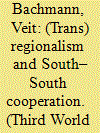

|
|
|
|
|
| Summary/Abstract |
The paper engages critically with the increasing importance of South–South cooperation and the shift from African–European to African–Asian interaction. It argues that South–South cooperation is too often framed in a spatial logics of regional integration and transregional cooperation and thus reproduces spatial understandings that are characteristic for African–European relations but misplaced in the context of African–Asian relations. Moreover, it analyses perceptions about the difference of European and Asian cooperation partners amongst political and societal elites in Kenya and Tanzania, arguing that instead of a shift from African–European to Afrasian spaces of interaction, the two mutually coexist and fulfil complementary functions.
|
|
|
|
|
|
|
|
|
|
|
|
|
|
|
|
| 2 |
ID:
144255
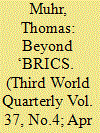

|
|
|
|
|
| Summary/Abstract |
Grounded in a review of past and present academic South–South cooperation literatures, this article advances ten theses that problematise empirical, theoretical, conceptual and methodological issues essential to discussions of South–South cooperation in the 21st century. This endeavour is motivated by the perceived undermining, especially in the contemporary Anglophone academic South–South cooperation literature, of the emancipatory potential historically associated with South–South cooperation. By drawing on the interventionist South–South cooperation agendas of ‘left’-leaning Latin America-Caribbean governments, the article seeks to establish a dialogue between social science theories and less ‘visible’ analyses from academic (semi)peripheries. The ten theses culminate in an exploration of the potential of South–South cooperation to promote ‘alternative’ development.
|
|
|
|
|
|
|
|
|
|
|
|
|
|
|
|
| 3 |
ID:
144260
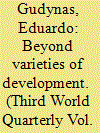

|
|
|
|
|
| Summary/Abstract |
Many South–South cooperation programmes have promoted development without fully discussing the implications of that concept. To evaluate this situation, recent heterodox development strategies are examined, particularly those under progressivist governments in South America. It is found that development strategies are certainly plural, but they all share a common pre-political background. To address this feature, the concept of ‘varieties of development’ is introduced. Then a new typology on the disputes over development is presented. Three types are recognised (controversies within a specific variety of development; disputes among different varieties; and disputes on alternatives to all varieties of development). The concept of Buen Vivir is presented as an alternative to development, and disputes of the third type, that involve this concept, are examined. Paradoxically, as the current focus of South–South cooperation is to reinforce conventional varieties of development, it is blocking alternatives, even the Southern option of Buen Vivir.
|
|
|
|
|
|
|
|
|
|
|
|
|
|
|
|
| 4 |
ID:
182945
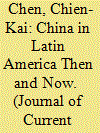

|
|
|
|
|
| Summary/Abstract |
Examining China’s policy towards Latin America from 1949 to the present day, this article uncovers a puzzle about China in Latin America: while the guiding doctrine of China’s policy towards the region has never changed (i.e. “South–South Cooperation” on the basis of the “Five Principles of Peaceful Coexistence”), there is a difference in terms of its policy goal between then and now (i.e. a very revisionist and politically focused goal until the late 1970s as compared to a less revisionist and economically focused one today). Based on the theory of systemic constructivism, this article demonstrates that the change of the interactions between China and other countries in our world (from isolation and confrontation to engagement and interdependence) has changed China’s perception about the nature of the international system, as well as its identity and interests in the system, which in turn has changed its policy goal towards Latin America and the “Global South” in general.
|
|
|
|
|
|
|
|
|
|
|
|
|
|
|
|
| 5 |
ID:
163068
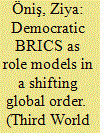

|
|
|
|
|
| Summary/Abstract |
India, Brazil and South Africa constitute an important subset of Brazil, Russia, India, China and South Africa (BRICS) and emerging powers at large in a shifting global order. The article examines the capacity of these democratic BRICS to serve as a role model to the rest of the developing world, at a time when liberal democracy seems to be experiencing serious challenges and dislocations in the Global North. The article considers the important achievements of democratic BRICS, in terms of their individual performances as well as through active cooperation strategies through organisations such as the India, Brazil and South Africa (IBSA) Dialogue Forum. Attention is drawn to the inherent structural dilemmas confronted by democratic BRICS to serve as genuine role models, given their domestic weaknesses as well as inherent constraints on their collective action strategies. Our central argument is that these countries, individually and collectively, are likely to have a crucial bearing on the future of liberal democracy on a global scale.
|
|
|
|
|
|
|
|
|
|
|
|
|
|
|
|
| 6 |
ID:
145879
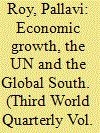

|
|
|
|
|
| Summary/Abstract |
The most visible success of the UN system has been to foster a multilateral structure of international governance that has proved resilient since World War II. However, this structure has failed to provide a financing mechanism to help developing countries achieve the structural transformations required for broad-based economic growth. Indeed, the Global South has also had many chances to reorder the international financing system but has failed thus far to do so. The global distribution of power remains with the USA and the West; even rising China plays by the contract-enforcement rules of the North in terms of global economic governance. Another critical reason why financing has not been readily available, despite the magnitude of capital flows between developed and developing economies, is that it comes with conditions that induce little ‘effort’ to result in capability development. Policies should be devised to overcome this weakness but they are unlikely within a multilateral framework. However, if the USA and China agree to work together on alternative multilateral systems promoted by the Global South, the potential for positive change increases.
|
|
|
|
|
|
|
|
|
|
|
|
|
|
|
|
| 7 |
ID:
136056
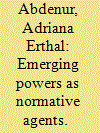

|
|
|
|
|
| Summary/Abstract |
Institutions are frequently thought of as ‘socialising’ member states into pre-established norms. However, this influence is not necessarily a one-way street; members can also affect institutions, whether individually or collectively. This article analyses the behaviour of two emerging powers – Brazil and China – within the field of international development. What roles have these two states played in shaping global development norms? The article examines the key motivations, positions, and initiatives taken by Brazil and China, with special reference to the UN development system (unds). Whereas Brazil and China’s early behaviour within the unds diverged significantly, in the post-cold war period both have become increasingly interested in – and capable of – influencing UN norms. However, despite greater involvement in UN development negotiations, these countries’ leverage in normative debates originates outside of the unds, through their South–South cooperation programmes. The current diversification of platforms through which the norms of international development are negotiated may enhance the influence of emerging powers, although their ability to channel this influence effectively will depend on their capacity for norm entrepreneurship, rather than mere norm blocking.
|
|
|
|
|
|
|
|
|
|
|
|
|
|
|
|
| 8 |
ID:
136053
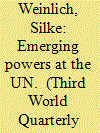

|
|
|
|
|
| Summary/Abstract |
The economic rise of China, India, South Africa, and Brazil has turned these countries into important providers of development assistance. While they seem increasingly comfortable in their bilateral relations with other developing countries, they are struggling to adapt their position within global institutions such as the United Nations. Do they turn their increased weight into a greater influence at the UN, and if not, why not? This article analyses financial contributions and political positioning at the UN in the area of development. Despite small changes, the four countries mostly insist on keeping their traditional status as recipients and ‘ordinary’ developing countries. This reservation can be explained in two ways: first, a more explicit leadership creates political and material costs that outweigh the potential benefits. Second, their shared experiences as developing countries make it hard to break ranks at the UN.
|
|
|
|
|
|
|
|
|
|
|
|
|
|
|
|
| 9 |
ID:
163076
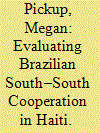

|
|
|
|
|
| Summary/Abstract |
I focus on evaluating Brazilian development and humanitarian cooperation in Haiti to answer how emerging providers such as Brazil are contributing to global development through cooperation. The paper establishes criteria for evaluation, arguing that global standards for aid effectiveness need to be expanded. I argue that when assessed on ownership, efficiency and sustainability, cooperation holds several advantages and limits, such as misplaced assumptions that Brazil’s approach is appropriate elsewhere. The discussion is rooted in the context of Haiti in order to underline how outcomes are not pre-determined, but rather depend on the model’s interaction with the partner context.
|
|
|
|
|
|
|
|
|
|
|
|
|
|
|
|
| 10 |
ID:
163075
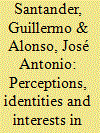

|
|
|
|
|
| Summary/Abstract |
The relevance acquired in recent years by South–South cooperation seems to be connected with deeper structural transformations occurring in the international system. However, the variety of cooperation models promoted by new providers in the South requires the identification of complementary factors to help explain current patterns. A set of socio-cognitive elements, related to each country’s perceptions, identities and interests, can yield greater understanding of the variety of South–South cooperation models. Such an approach is here applied to the cases of Chile, Venezuela and Brazil – three important providers from the South – in order to explore their different cooperation models.
|
|
|
|
|
|
|
|
|
|
|
|
|
|
|
|
| 11 |
ID:
144261
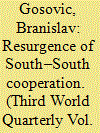

|
|
|
|
|
| Summary/Abstract |
This essay undertakes to depict, in broad strokes, the evolution, obstacles and main junctures in the history of South–South cooperation. It also suggests some practical and feasible ways for overcoming difficulties, ways that could infuse this aspect of international development cooperation with greater dynamism, more fully tap its inherent and growing potential for the attainment of the practical and systemic objectives that developing countries have for decades been striving for in the North–South development dialogue and negotiations, and strengthen these countries’ influence and role in world affairs and global governance.
|
|
|
|
|
|
|
|
|
|
|
|
|
|
|
|
| 12 |
ID:
143573
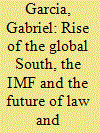

|
|
|
|
|
| Summary/Abstract |
Following the onset of the Asian Financial Crisis the world has witnessed a re-accommodation of the global financial system. In the particular case of middle-income countries they have disentangled themselves from the conditionality of the IMF and grown into more assertive actors in international forums, proposing new alternative mechanisms to become more financially independent and for the provision of development assistance. This article critically reviews the new reality by assessing the strategies deployed by developing countries to reduce the IMF’s influence, and explores the potential consequences of the rise of middle-income nations for Law and Development.
|
|
|
|
|
|
|
|
|
|
|
|
|
|
|
|
| 13 |
ID:
136055
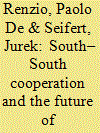

|
|
|
|
|
| Summary/Abstract |
International development cooperation is undergoing fundamental changes. New – or often re-emerging – actors have gained importance during the past two decades, and are increasingly challenging the traditional approach to development cooperation associated with the members of the Development Assistance Committee of the oecd. Their supposedly alternative paradigm, ‘South–South cooperation’ (ssc), has been recognised as an important cooperation modality, but faces contradictions that are not too different from those of its North–South counterpart. ssc providers are highly heterogeneous in terms of policies, institutional arrangements, and engagement with international forums and initiatives. This article contributes to current debates on ssc by mapping the diversity of its actors – based on illustrative case studies from the first and second ‘wave’ of providers – and by presenting and discussing some possible scenarios for the future of ssc within the international aid system.
|
|
|
|
|
|
|
|
|
|
|
|
|
|
|
|
| 14 |
ID:
136050
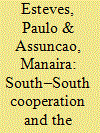

|
|
|
|
|
| Summary/Abstract |
This article discusses the transformation in development architecture, focusing on the role of emerging powers and the growing relevance of South–South cooperation (ssc). Drawing on a conceptual toolkit based on the work of Pierre Bourdieu, it aims to approach ssc as a narrative and to understand the processes of contestation that have turned international development into a battlefield since the end of the 1990s. The article argues that the emergence of ssc has contributed to decentring the field of international development, both in terms of the agents authorised to play and the practices considered legitimate. Within this process the Global Partnership for Effective Development Cooperation, led by the oecd’s Development Assistance Committee, and the United Nations Development Cooperation Forum have become two sites on the battlefield on which the borders of international development are being redrawn.
|
|
|
|
|
|
|
|
|
|
|
|
|
|
|
|
| 15 |
ID:
144251
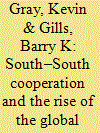

|
|
|
|
|
| Summary/Abstract |
In this introductory article we examine the recent resurgence of South–South cooperation, which has moved once again onto the centre stage of world politics and economics, leading to a renewed interest in its historic promise to transform world order. We provide an overview of contemporary debates surrounding this resurgence, noting in particular the division between those who are optimistic with regard to the potential of Southern economic development and the project of liberation from Northern domination, and the more pessimistic critics, who see this very success of the South as being subsumed within the existing global capitalist development paradigm.
|
|
|
|
|
|
|
|
|
|
|
|
|
|
|
|
|
|
|
|
|